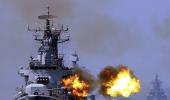The Indian Navy has effectively carried out mission-based deployment to protect maritime interests by positioning ships and aircraft at major and sensitive locations, defence minister Rajnath Singh said on Wednesday, amid a tense border row with China.

In an address to top naval commanders at the inaugural session of a three-day conference, Singh also complimented the force for protecting the nation's maritime interests and expressed confidence in its preparedness to meet any challenge through a "proactive response" in deploying its ships and aircraft, the navy said in a statement.
The conclave is aimed at carrying out a comprehensive review of the evolving regional maritime security matrix as well as the overall implications of the border row with China in eastern Ladakh.
The Indian Navy has deployed a range of its frontline warships and submarines in the Indian Ocean region to send a clear message to China following the escalation of the border dispute in eastern Ladakh.
"I applaud the Indian Navy for their role in protecting the maritime interests of the nation. I have full confidence in the navy's preparedness to meet any challenge through a proactive response in deploying its ships and aircraft," the defence minister tweeted.
All possible security challenges that the country may face including from China in the Indian Ocean Region were discussed at the conclave, people familiar with the issue said.
"The Indian Navy has effectively carried out mission-based deployment to protect maritime interests by deploying naval ships and aircraft at major and sensitive locations," Singh said, adding it has helped to increase maritime domain awareness and in extending rapid humanitarian aid and relief.
The Indian Navy started rolling out its mission-based plan in June 2017 that involved deploying mission-ready ships and aircraft along critical sea lanes of communications with an aim to effectively counter China's growing presence in the Indian Ocean region.
Singh said it is inspired by Prime Minister Narendra Modi's vision of SAGAR (Security And Growth for All in the Region).
He also highlighted the creation of the post of Chief of Defence Staff and Department of Military Affairs/MoD (DMA) as major milestones in bringing more synergy among the three services, especially in training, procurement and jointness in operations.
The defence minister said that accepting the challenges arising out of the COVID-19 pandemic in the current financial year, the Indian Navy has continued to make progress in operational, administrative and modernisation efforts.
Notwithstanding these fiscal challenges, the government has invoked the Emergency Powers to meet the emergent requirements of the services, he added.
The key focus of the conclave included reviewing the Indian Navy's operational readiness as well as issues relating to India's security interests in the Indo-Pacific, officials said.
The Indian Ocean, considered the backyard of the Indian Navy, is critical to the country's strategic interests. Over the years, the region has witnessed an increasing Chinese presence.
China has constructed the deep-sea Gwadar Port in southern Pakistan and a naval base in Djibouti in the Horn of Africa.
In the last few weeks, the Navy has significantly expanded its deployment in the Indian Ocean Region, positioning a plethora of warships and submarines following the Galwan Valley clash with Chinese troops in eastern Ladakh in which 20 Indian Army personnel were killed.
The Chinese side also suffered casualties but it is yet to give out the details. According to an American intelligence report, the number of casualties on the Chinese side was 35.
In his address to the naval commanders, the defence minister also congratulated the Navy for carrying out the 'Operation Samudra Setu' under which around 4,000 Indians were evacuated from a number of countries including Iran and Maldives due to the coronavirus pandemic.
"I congratulate the @indiannavy on the conduct of the biggest ever evacuation operation 'Operation Samudra Setu', which has contributed extensively to the national interest," the defence minister said in another tweet.
Singh also complimented the Navy for being at the "forefront" of the indigenisation process for defence platforms.
At the conference, the naval commanders would also deliberate on ensuring tri-services synergy as well as functional reorganisation within the Navy to improve efficiency, the Navy said in a statement on Tuesday.











 © 2025
© 2025